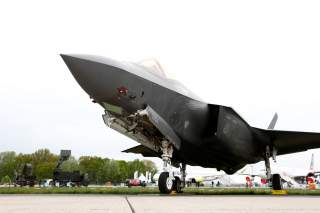Who Makes the Finest Weapons: America, China, or Russia?
Let's take a look.
Key point: Washington wants to sell more weapons to foreign countries. In order to win over customers, the United States is touting its superior (although more expensive) systems.
The U.S. government has a message for those nations that would buy Russian and Chines weapons: buyer beware.
“We have come a long way since the AK-47 became the ubiquitous symbol of Soviet-backed insurgencies from Southeast Asia to Africa,” R. Clarke Cooper, Assistant Secretary of State for Political Military Affairs, said during a speech at the Meridian International Center. “Today, Russia is working hard to foist variants of its S-400 air defense system around the world, while China is supplying everything from armored personnel carriers to armed drones. To quote another Latin phrase – caveat emptor! – Buyer, beware. We have seen countries around the world leap at the chance to obtain high-tech, low cost defensive capabilities, only to see their significant investments crumble and rust in their hands.”
Cooper cited examples where Chinese weapons haven’t lived up their sales pitches. “In Africa, Cameroon procured four Harbin Z-9 attack helicopters in 2015: one crashed shortly after being handed over. Kenya invested in Norinco VN4 armored personnel carriers – vehicles that China’s own sales representative declined to sit inside during a test firing.”
“And similarly, amongst our partners in the Middle East, we’ve seen instances in which countries that have procured Chinese CH-4 armed drones have found them to be inoperable within months, and are now turning around to get rid of them,” he added. “Caveat emptor!”
Cooper’s sales pitch for U.S. weapons comes as U.S. weapons have taken a bit of a black eye. The recent drone and missile attack on Saudi Arabian oilfields, launched by Iran or its Houthi allies, led to criticisms that Saudi Arabia’s array of American-made Patriot air defense missiles had failed to detect and destroy the hostile munitions. Naturally, Russia hasn’t missed the opportunity to tout its S-400 air defense system as the better option.
Significantly, Cooper mentioned the S-400 twice in his speech.
Curiously, Cooper did not offer specific instances of Russian weapons failures, though there have been no lack of examples in conflicts such as the Arab-Israeli wars. Instead, he accused Russia of aggressive sales tactics. “Through the targeted marketing of systems like the S-400, Russia seeks to exploit the genuine security requirements of partners to create challenges in our ability – legal and technological – to provide them with the most advanced defensive capabilities. And through a combination of cut-price systems such as unmanned aerial systems, predatory financing mechanisms, and sometimes outright bribery, China is using arms transfers as a means of getting its foot in the door – a door that, once opened, China quickly exploits both to exert influence and to gather intelligence.”
Cooper also took aim at Chinese training of foreign soldiers. “Foreign trainees may be wooed by the offer of unit-scale training in China, but on arrival they are disappointed to find themselves not spread among the elite Chinese training academies, but are lumped together with forces from around the world of significantly varying quality in China’s International Military Education Exchange Center – a facility whose lackadaisical approach to military education is well below the standard China provides to its own officers. Caveat emptor!”
The American view is that Russia and China can make arms sales because they have few scruples about whom they sell weapons to. Yet Cooper acknowledged that there are concerns about the reliability of the U.S. as an arms supplier, for which he blamed the U.S. Congress, which enacted a block on arms sales to Saudi Arabia that was only overturned by a veto by President Trump.
So why buy American weapons? Cooper said there are three reasons: quality, transparency, and accountability.
“The U.S. defense industry produces the best defensive equipment on the planet,” he claimed. In addition, U.S. arms export policy is not hidden. “Unlike the determinations made in Beijing or Moscow, our major foreign military and direct commercial sales are managed via a process whose policies are clear and transparent, and whose approvals are public.”
Ironically, while blasting Russian and Chinese arms sales, Cooper said the U.S. had sweetened its own Foreign Military Sales program. “We made the foreign military sales process faster and cheaper, reducing the time it takes from receipt of a partner’s request to making an offer by nine percent, while reducing the overhead fees captured by the FMS Admin surcharge from 3.5 percent to 3.2 percent and lowering several FMS Transportation rates by between one percent and 7.5 percent, saving foreign partners approximately $180 million in the past year alone.”
“When you buy FMS you obtain the same pricing as the U.S. military services; you participate in a system that is resistant to corruption; and, you get the total package approach: not just a defense article, but a defense capability, from the training required to use, maintain, and integrate it into your doctrine and operations, to the parts and components required for long-term maintenance and support.”
Whether this argument will be persuasive enough to induce other nations to buy American weapons remains to be seen.
Michael Peck is a contributing writer for the National Interest. He can be found on Twitter and Facebook. This first appeared in 2019.
Image: Reuters

